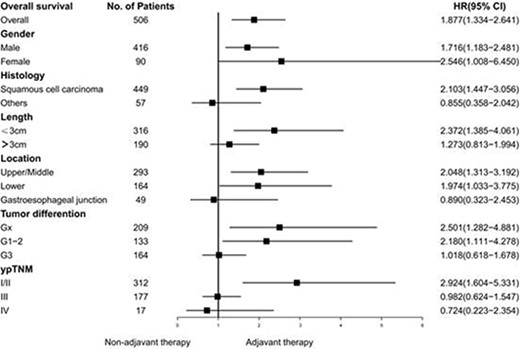-
PDF
- Split View
-
Views
-
Cite
Cite
Xiaokun Li, Yong Yuan, 236. THE ROLE OF ADJUVANT THERAPY FOLLOWING NEOADJUVANT CHEMORADIOTHERAPY AND ESOPHAGECTOMY IN ESOPHAGEAL CANCER, Diseases of the Esophagus, Volume 37, Issue Supplement_1, September 2024, doae057.023, https://doi.org/10.1093/dote/doae057.023
Close - Share Icon Share
Abstract
The objective of this study was to assess the role of adjuvant therapy following neoadjuvant chemoradiotherapy and esophagectomy in esophageal squamous cell carcinoma (ESCC).
We conducted a retrospective analysis involving 506 ESCC patients who underwent trimodal therapy. The clinical significance of adjuvant therapy on overall survival and disease-free survival was evaluated using Kaplan–Meier curves with log-rank tests, the Cox regression model, and a forest plot displaying hazard ratios (HR) with 95% confidence intervals.
Among the 506 patients who had clinically positive lymph nodes and no metastasis after neoadjuvant chemoradiotherapy and esophagectomy, those who received adjuvant therapy exhibited shorter post-resection overall survival (OS) and disease-free survival (DFS), with a statistically significant difference between the two groups (Log-Rank, OS: P = 0.002; DFS: P < 0.001). Adjuvant therapy was not identified as an independent prognostic factor for OS (HR: 1.249; 95% CI: 0.869-1.796; P = 0.230), but it was a significantly unfavorable independent prognostic factor for DFS (HR: 1.868; 95% CI: 0.349-2.586; P < 0.001).
Adjuvant therapy is associated with poorer overall survival (OS) and disease-free survival (DFS) outcomes in ESCC patients with ypTNM stage I and II on final pathology following neoadjuvant chemoradiotherapy and esophagectomy. However, there was no significant difference observed in patients with ypTNM stage III or IV. Therefore, it is not recommended to undergo postoperative adjuvant therapy for patients with ypTNM stage I and II ESCC. However, for patients with ypTNM stage III and IV ESCC, further research is needed to explore adjuvant treatment strategies.




